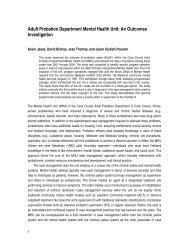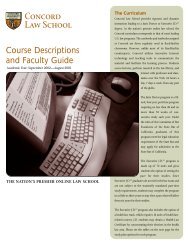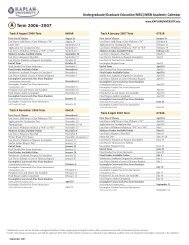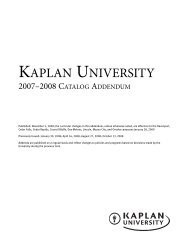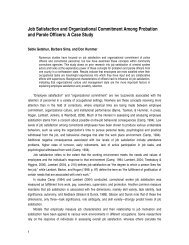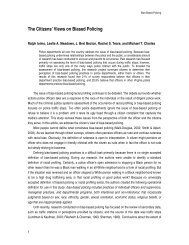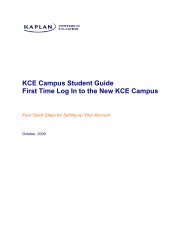Police Officer - Kaplan University | KU Campus
Police Officer - Kaplan University | KU Campus
Police Officer - Kaplan University | KU Campus
Create successful ePaper yourself
Turn your PDF publications into a flip-book with our unique Google optimized e-Paper software.
<strong>Police</strong> <strong>Officer</strong> Recruitment<br />
Discussion<br />
This study represents the first application of the recruitment simulation technique (Rynes<br />
& Barber, 1990) relative to the task of recruiting law enforcement personnel. Although this<br />
investigation was grounded in an appropriate recruitment framework--the Rynes and<br />
Barber (1990) applicant attraction model--the study was exploratory in nature due to the<br />
lack of previous empirical findings addressing police officer recruitment.<br />
The researcher made the assumption that the existence of a residency requirement<br />
at the hiring police agency would influence job rating (dependent variable) negatively. A<br />
residency requirement may limit the quality-of-life options for a prospective police officer.<br />
Examples of quality-of-life options follow: (a) the quality of the local school system, (b) the<br />
local crime rate, (c) the local housing market, including the cost of housing; (d) the resale<br />
value of housing; (e) the quantity of housing in neighborhoods perceived as “good” (f) the<br />
local tax rate, including real estate taxes, (g) payroll taxes; and (h) other miscellaneous<br />
taxes. Another assumed disincentive of a required residency requirement is that police<br />
officers and their families may become targets of harassment from individuals the police<br />
officer may contact during the course of performing the law enforcement function and from<br />
friends and family members of these individuals.<br />
As the ANOVA results demonstrate, the assumption that a residency requirement<br />
would be a disincentive to potential job applicants was not supported in actual participant<br />
reactions. The researcher speculates the independent variable residency requirement<br />
was not significant to the practicing police officers in this study for the following reasons:<br />
the participating police officers role-played as applicants for a police officer vacancy by<br />
imagining they were at an early stage in their career seeking an entry level police officer<br />
position. It may be that quality-of-life options are a secondary consideration in the decision<br />
making process for a potential police officer at the start of a career.<br />
The researcher further speculates that the study participants’ age, number of<br />
dependent children, and amount of job experience may be factor in lack of significance of<br />
the residency variable not being significant. It may be that the police officer participants<br />
with a mean age of 36, a mean number of children of 1.2, and less than 10 years job<br />
experience were not as affected by quality-of-life issues as older and more experienced<br />
police officers might be.<br />
The researcher also assumed that the opportunity for job specialization would be a<br />
positive incentive to potential job applicants. The ANOVA results suggest the assumption<br />
that opportunity for specialization is a positive incentive to potential job applicants was not<br />
confirmed. The possible explanation for the independent variable of opportunity for<br />
specialization not being significant to practicing police officers in this study is the same<br />
Professional Issues in Criminal Justice Vol 4(3 & 4), 2009 77



